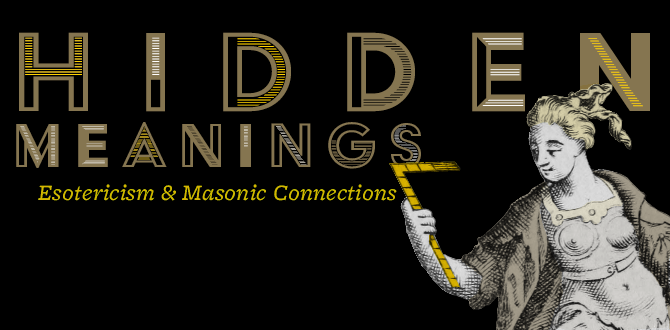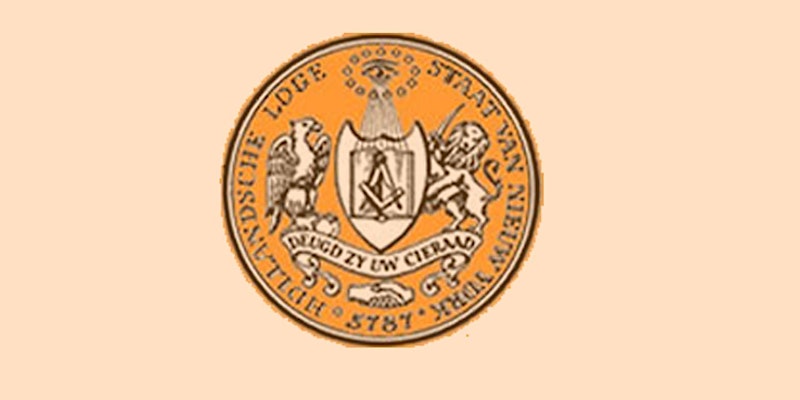Thursday, February 25, 2021
‘From Taverns to Temples’
Wednesday, February 24, 2021
‘NEW BOOK: Masonic Almanac’
- Glossary of Terms, Abbreviations, and Contractions
- Part One: Chronology of Masonic Events (1730 — 1774)
- Part Two: Chronology of Lodges by Colony and Location
- Part Three: Lodges in North America by Chartering Source
- Part Four: Lodges in North America by Colony
- British Military and Colonial Militia Lodges in North America
- Lodges in Canada
- Caribbean Lodges
- Biographies of American Provincial Grand Masters
- Famous American Freemasons
- Bibliography
- Alphabetical Listing of Lodges (1730-1774)
‘Help Wanted: decoding these symbols’
- The crossed quills are standard, but what of those three crowns? The three GMs? But why with the quills?
- The item below the quills?
- I have no idea what that is to the right of the moon.
- The chalice? Is that from a ritual beyond the three Craft degrees, or something still in use by English lodges?
Tuesday, February 23, 2021
‘Lodge culture discussion’
Sunday, February 21, 2021
‘Prince Hall: Founding Father’
 |
‘Grant dollars to benefit grand lodge historic building’
Saturday, February 20, 2021
‘Gronning’s golden anniversary’
 |
| J. William Gronning |
Friday, February 19, 2021
‘A Masonic menu for our return to lodge’
Wednesday, February 17, 2021
‘The human being and architecture’
- Alberti’s principles, including the steps involved in making a classical building.
- That an architect in the Renaissance strived to create forms which accord with the constitution of a human being.
- That a building by Alberti was intended to have a positive impact on a beholder, which involved acting in a civilized manner within the city.
- How to invoke Alberti’s ideas to clarify the nature of debates in the present about architecture and the city.
‘The performing arts and Masonic values’
Tuesday, February 16, 2021
‘The fine arts and Masonic values’
Sunday, February 14, 2021
‘Wanted: Masonic citizens’
In lieu of the Masonic Society’s usual banquet during the annual Masonic Week festivities in Virginia, we gathered via Zoom Friday night to host one of the most dynamic thinkers and persuasive speakers on the Masonic scene today. As president of the Society, I hadn’t anticipated the pandemic would still hound us into 2021, so I in fact had been planning for our customary dinner-lecture at the hotel in Arlington when I first contacted MW Bro. Akram Elias last June. It was my desire to find a speaker who would continue a theme opened by RW Bro. Eric Diamond, one of our Board members, who addressed the group in 2019 with a speech that rightly should arouse Freemasonry’s latent desire to infuse a positive energy into the public square because, candidly, Freemasonry has turned into an introspective and persnickety historical society. Having discovered earlier in 2020 the Masonic Legacy Society, co-founded by Elias, I recognized exactly such a presenter of urgent Masonic ideals. He graciously agreed to join us, without any hesitation, mental reservation, etc.
MW Elias has been a Freemason since 1996, when he was initiated, passed, and raised in Potomac Lodge 5 in Washington, DC. He has presided in the East of La France Lodge 93, Benjamin B. French Lodge 15, Cincinnatus Lodge 76, and Pythagoras Lodge of Research, all in Washington, where he also is a founding member of other lodges. In 1999, he joined the Grand Lodge officer line, culminating in his term as Grand Master in 2008. He is a York Rite and Scottish Rite Mason, and a Shriner, as well as a member of invitational groups. His Masonic accolades and accomplishments are too numerous to include here. In his professional concerns and employments, Elias has been engaged in the field of international relations for more than thirty years; he is a co-founder and president of Capital Communications Group, Inc., an international consultancy that provides to governments and private clients alike an array of strategies for navigating across humankind’s varied nations and cultures.
His presentation is titled “Freemasonry in 2026: A Force for Good, or a Footnote in History?” He spoke for approximately thirty minutes before fielding questions for an hour. We are in the process of editing the webinar video to make it available online to all. The following summary of Elias’ remarks will appear in the upcoming issue of The Journal of the Masonic Society, due out in April.
“I hope every Freemason would take a few moments to truly think deeply and seriously about what it means to be a Freemason in our country five years before our country celebrates the 250th anniversary of our independence,” he begins. “And about the special relationship that has existed between the Founding of the Great Experiment and the role Freemasonry has played in the establishment, development, and evolution of the Great Experiment; and where we are today—at a major crossroads. Will Freemasonry rise to the challenge once again to help propel this Great Experiment into the future?”
Elias defines the Great Experiment as the uniquely American system of governance needed “to advance the human condition.” Not only democratic elections, which had been tried with only partial benefits to previous societies, but also “the genius of the Founding Fathers,” meaning government as a “systems engineering machine that people can use to solve their own problems.” By employing individual liberty, self-governance, and the rule of law, America, which he acknowledged was led at that time by white, Anglo-Saxon property owners, could set in motion a system that would “expand the Experiment” so as to include and embrace all the people of America.
“Enlightened citizens are of the utmost importance to the success of this Great Experiment,” he also says, and that is where Freemasonry enters the history. “Masonic lodges truly were incubators” where its members elected their leaders, voted on legislation, and honed their skills in rhetoric. The lodge experience produced leaders of local communities who could safeguard freedom, which is always endangered. “America created civil society,” he adds. While the world always had “society” consisting of structures—religion, ethnicity, family—that predetermined a person’s identity, it took the American Experiment to birth a place where an individual could relieve himself of constraints and enjoy freedom of speech, freedom of religion, freedom to assemble, and other inalienable rights. “It is also, from an Enlightenment perspective, freedom from ignorance, freedom from bigotry, freedom from superstition.”
“Masonic lodges spread across the country. It was a place where people learned to govern themselves,” Elias continues. “They were laboratories where Masonry is taken seriously. How does Masonry take an individual and make him better? That happens by studying seriously the deeper meanings of the symbols and allegories of our Craft. It is the esoteric, the hidden aspect, that enables a person to transform from within.”
“Masonry was instrumental to help bring people together of different backgrounds to try to work together to build their communities.” The result over time was making the Great Experiment more inclusive. “One way to look at the evolutionary history of the United States is to see each generation had to fight its own viruses—we live in a COVID pandemic right now. Viruses have variants and can spread sometimes like wildfire. Well, ignorance, superstition, bigotry, and extremism are viruses, and each generation of Americans would face those,” he says, referring to the revolutions in American life that ended chattel slavery and racial segregation, and that expanded suffrage and economic opportunity beyond the original Founders’ social class. “It took generations and generations of Americans to fight hard and make the Experiment more inclusive.”
“As Masons, we are taught in our ritual—we live it in many jurisdictions in our country—we need to attract people of different faiths, backgrounds, races, nationalities, etc.,” he explains. “We know what are the minimum criteria for someone to knock at the door and be accepted in our Craft.”
“Five years before we celebrate our 250th anniversary, given where our country is, what are Freemasons going to do?Are we, as Freemasons, going to go to lodges and do the stuff that we would typically do—conduct some business, maybe spend some good time together because we are fellows who like one another and spend an evening together—or are we going to really go back to the fundamentals of Freemasonry and make it relevant again?”
“Freemasonry has a unique role: It is to build a better person, a more engaged, enlightened citizen, and that’s what we need, because if we don’t have enlightened citizens who take on the responsibility, engage the system engineering machine, to move us forward, solve our problems, always expanding opportunity for all—if we don’t do that, it becomes the rule of the mob,” Elias adds conclusively. “As Benjamin Franklin told that lady who asked ‘What have you given us, Dr. Franklin?’ And he said ‘A republic, madam, if you can keep it.’ And a republic needs enlightened, engaged citizens.”
‘Esotericism and Masonic Connections’
Saturday, February 13, 2021
‘Grotto Day: an opportunity to howl’
Monday, February 8, 2021
‘Be there on Friday’
Saturday, February 6, 2021
‘33 & Beyond’
Friday, February 5, 2021
‘Oscar is next OpenLFM speaker’
Tuesday, February 2, 2021
‘The historic lodge without a grand lodge’
Monday, February 1, 2021
‘To work in the color purple’
 |
| Israel Antiquities Authority |














































































